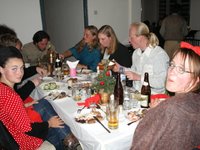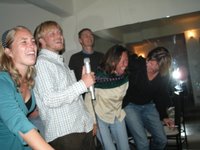In Nepal we follow a different calender, which means that I am actually living in the year 2063. We have just entered the 10th month of the year, Magh.
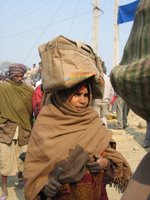
The first day of Magh, known as Maghi, is one of many holidays in Nepal. But for many young Tharu girls this day is met with mixed feelings. These young girls, known as Kamalari, live like slaves; there parents are very poor and often forced to “sell” their daughters as maids in other families. Already from the age of 5 are they sold. Their working conditions are poor with 12-14 hours work a day, a bed in the kitchen and a yearly salary of 35 US – yes, a year!
The parents negotiates one-year contracts for the girls and according to customs this always happens on Maghi. This means that every Maghi the girls leave their work place to meet up with their parents. Often this is the one day a year where the family is together. However, Maghi is also the day that a new contract is being negotiated and the Kamalari will leave on that very day to work for a new family in a new area. It is with a lot of insecurity that the girls move to the new household, since they do not know what to expect regarding work conditions, physical and psychological violence might be part of their new life as well as sexual abuse.
The tradition with K

amalari is practiced in all of Terai. Often the negotiation is done privately but in the Dang district there is an actual market for this. Marcus, Sara and I spent this Maghi visiting that market.
In the beginning it looked like an ordinary marked with plenty of food stalls and junk. Rather quickly we realized though that there also were Kamalari and not only that but entire families looking for work carrying around their small bundles with their few private belonging. Most likely that was ex-kamaras – free bounded labours – looking for a way to survive.
Since some locale organization has started to work against this tradition nothing was done out in the open and it was difficult to get people to talk. I did manage to talk to an India
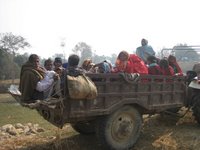
n farmer, that had come to the market to purchase 10 workers for the farm in India. He told me, that a good worker would cost him 5.000 Indian Rupees a year – roughly 100 US.
This kind of slave trading cannot be classificed as human rights violations (as Sara and Marcus told me), since the people freely enter into this one-year contract. For many people the market in Dang is their only opportunity to find work and ensure the survival of the family. Still, it is sad to see these people sitting in groups with all their belongs waiting for a buyer. The Dang market gives a clear picture of the extreme poverty that a great part of the population of Nepal lives in.

There was, however, one good story to tell from that day. On the way to the market our driver “unfortunately” hit a chicken on the road. He and the photographer went running after it into the forest and came back proudly carrying a dead chicken – a great contribution to the Maghi feast at their homes.






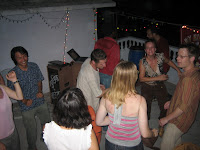










 PMC meeting
PMC meeting














 smaller group ;-)
smaller group ;-)











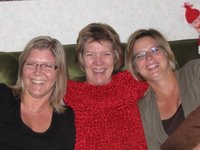
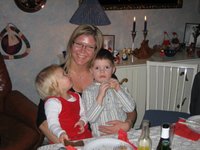 Christmas at home was just as nice and relaxing as expected. Naturally, I ate too much food and candy joined by too many beers and glasses of wine and too little exercise – but since it is once Christmas once a year, so it is allowed…..
Christmas at home was just as nice and relaxing as expected. Naturally, I ate too much food and candy joined by too many beers and glasses of wine and too little exercise – but since it is once Christmas once a year, so it is allowed…..



